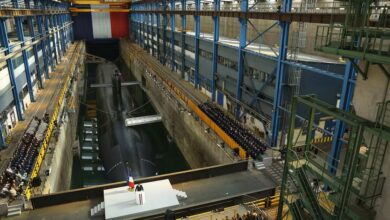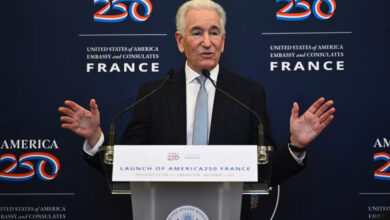
French President Emmanuel Macron appointed a former Green lawmaker as his new environment minister on Tuesday, hoping to inject new life into his rattled administration after a summer of problems and before another round of reforms.
Macron was forced into the move after Nicolas Hulot, a popular eco-campaigner, resigned live on radio last week over what he felt were hollow commitments on environmental policy.
The nomination of Francois de Rugy to replace him reflected Macron’s desire to give the sensitive portfolio, which includes energy, to a thick-skinned career politician with experience balancing ideals with political realities, energy analysts said.
The 40-year-old president also named Roxana Maracineanu as sports minister to replace former Olympic fencing champion Laura Flessel, who said she was quitting for personal reasons. Maracineanu is an Olympic swimming silver medalist.
Hulot’s resignation was a blow for Macron, who is still reeling from a bodyguard scandal in July just as he prepares to embark on reforms to cut public sector jobs, tame the budget deficit and streamline the pension system.
For much of Macron’s first year in power, the former investment banker appeared untouchable, self-assured and unphased by his falling popularity as he pushed through investor-friendly reforms with business-like efficiency.
Recently, however, Macron has looked more vulnerable.
Economic growth is slower than forecast, undermining his deficit-busting credentials. Unemployment is no longer coming down. Usually decisive, Macron is wavering on an impending tax collection reform. Meanwhile, voters are growing impatient with his monarchical style and sharp tongue.
“It wasn’t supposed to happen to this president. He promised to be audacious in his reforms, efficient in the exercise of power, and the embodiment of dignity. In his first few months the promise was kept, but now everything is going wrong,” the right-leaning Le Figaro said in an editorial on Monday.
“Year Zero”
Even so, Macron’s minimalist reshuffle, with just two changes, points to a president determined to pursue his reforms and not be seen to react to the latest poll numbers, analysts said.
He has sold his pro-business overhaul on promises that it will boost growth and jobs, but voters spanning typically conservative pensioners to low-income workers complain his policies mostly favor big business and the wealthy.
Next up for his centrist government is tackling social spending — a delicate balancing act as he seeks to restore credibility with the left — just as weaker-than-forecast growth puts pressure on the budget deficit.
Macron’s election victory, which blew apart France’s mainstream parties and halted the march of the far-right National Front party, delighted French business and urban, liberal voters.
But prone to haughty and at times condescending remarks, he has struggled to connect with common folk.
An IFOP-Fiducial survey on Tuesday showed just 31 percent of respondents were happy with his performance, with support eroding across all ages on both the political left and right. The headline number was down 10 percentage points.
That is lower than his predecessor Francois Hollande was at the same stage in the socialist’s presidency. Hollande went on to become so unpopular he was the first president in France’s Fifth Republic not to run for re-election.
“It’s something of a ‘year zero’ for Emmanuel Macron. The slate is being wiped clean, even his popularity is starting at zero again. Everything has to be rebuilt,” said Philippe Moreau Chevrolet of the Sciences Po political school in Paris.
In a rare moment of humility, Macron on Monday acknowledged the challenges to a class of young school students: “There are some days which are easy, and others which are not.”




